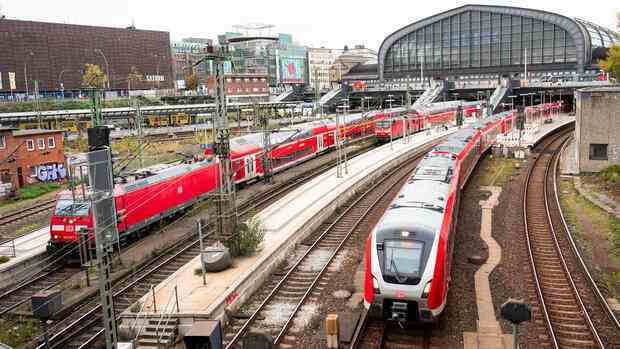Dusseldorf In the collective bargaining dispute between Deutsche Bahn and the railway workers’ union EVG, the first warning strikes in rail transport are threatening at the beginning of March. This is suggested by the vehement rejection of the union demands that came out of the Berlin DB headquarters this Friday.
There, the twelve percent demanded by the EVG by which wages and salaries are to increase within a year is largely misleading. “Because at the same time it is required to grant the employees at least 650 euros per month, the actual increase would be an average of 18 percent,” criticizes the railway. In individual cases, the wage increase would even correspond to 30 percent. But this is not affordable.
Next Tuesday, DB and EVG will meet for their first wage round in Fulda. While the union submitted its total of 57 points days ago, there will probably be no counter-offer from the employer’s side for the time being. But this increases the risk of strikes. “If there is no offer on the table after the first round of negotiations,” explained EVG collective bargaining leader Kristian Loroch a few days ago, “a warning strike would be conceivable.”
In the two Corona years, restraint was exercised, Loroch justifies the surcharges now required. They should apply to around 180,000 of the 220,000 railway employees. An exception are 18 of the 300 DB companies in which the competing union GDL holds the majority of employees. The desired conclusion will therefore not apply there and will be negotiated separately this autumn.
On the other hand, for the first time, the EVG is also campaigning for identical wage agreements at 50 DB competitors. Although this gives the union more power to strike, it also makes the collective bargaining dispute more complicated and time-consuming.
DB warns of additional costs of 2.5 billion euros
According to the Berlin state-owned company, the EVG is not satisfied with the wage supplements it is asking for. Around 80,000 employees are also to be regrouped, which will ultimately result in an average salary increase of 25 percent. Deutsche Bahn would be burdened with an additional 2.5 billion euros in the financial year, which would slow down the urgently needed conversion of the ailing infrastructure, as management fears. After all, the group’s railway operations are also expected to be in the red in 2023, they say.
There is also dissent on the subject of the inflation compensation premium. While the DB would like to include the tax-free one-time payment of up to 3,000 euros in the negotiations, the union rejects this because of the lack of sustainability. “In the metal and chemical industry, this instrument was fully exploited in collective bargaining,” Deutsche Bahn counters. In addition, she calls for a longer tariff term than twelve months – and thus encounters resistance from the EVG. “We want to be able to adapt to new situations more quickly,” says Loroch.
There is also disagreement on the issue of the minimum wage. While the EVG speaks of “groups below the minimum wage”, DB mentions a current lower wage limit of 12.65 euros. “We are five percent above the legal requirements,” says a manager. There may be a conflict here with private DB competitors who pay less to get started.
More: The EVG railway union is demanding twelve percent more wages – and expects strikes
